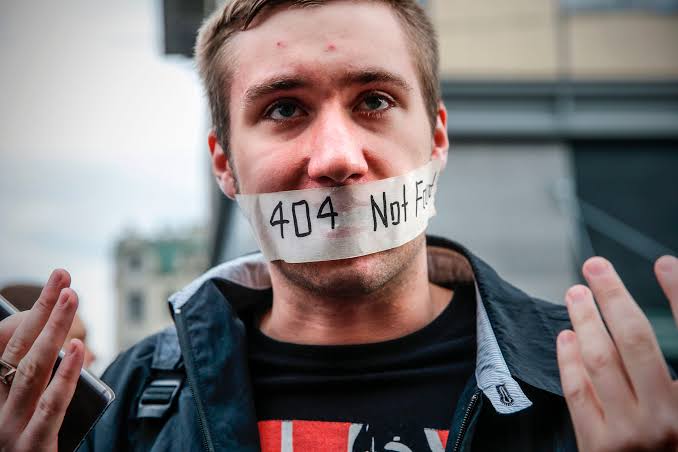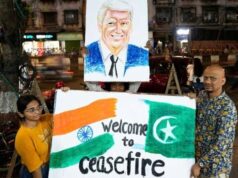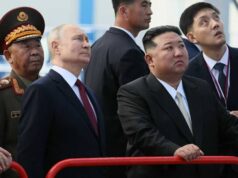Media manipulation threatens freedom and democracy in America

By Vijaya Laxmi Tripura
In the American tradition, the media has long been viewed as a “fourth estate,” a check on power that shines a light on government actions and provides a platform for informed public discourse.
However, in recent years, the integrity of this role has come into question as the press increasingly reflects partisan interests.
Nowhere was this clearer than in the recent media furor surrounding former President Donald Trump’s critique of Liz Cheney’s foreign policy record.
His remarks, intended to criticize Cheney’s hawkish military stance, were swiftly spun by the press into a sensationalized narrative of violent threats.
This incident, while hardly unique, is a stark example of how modern media operates in a way that prioritizes partisan narratives over objective reporting, posing a threat to the very concept of a free and informed society.
During an October 31 conversation with Tucker Carlson, Trump voiced his longstanding disapproval of Cheney’s foreign policy agenda, characterizing her as a “radical war hawk.”
He argued that Cheney’s support for US military interventions risks American lives and has contributed significantly to the country’s $36 trillion debt.
Trump’s point was clear: while politicians like Cheney promote policies that place American soldiers in harm’s way, they often do so from the comfort and safety of Washington, far removed from the frontlines.
In his typically blunt style, Trump suggested that if politicians advocating for military interventions were to face the same dangers as the soldiers they deploy, they might reconsider their enthusiasm for conflict.
Yet, within hours, Trump’s comments were twisted into a pseudo-scandal by many media outlets, accusing him of promoting violence against Cheney.
Major news platforms latched onto this interpretation, painting Trump’s remarks as threatening rather than critiquing Cheney’s foreign policy.
The result was a manufactured media firestorm that misrepresented Trump’s comments and furthered a specific political narrative.
The rapid transformation of Trump’s critique into a so-called “violent threat” fits into a broader pattern of media distortion. When Trump or any non-Democratic figure makes statements that criticize establishment or left-leaning policies, certain segments of the media frequently respond by manipulating or sensationalizing these comments.
Rather than providing balanced reporting, these media outlets often emphasize controversy, framing remarks in a way that appears scandalous or inflammatory, even if the original message was clear.
This tactic isn’t new. The Trump administration witnessed repeated instances of misinterpretation or selective reporting, from the Russia collusion narrative to the portrayal of Justice Brett Kavanaugh’s Supreme Court confirmation as a national controversy.
In both cases, media coverage actively shaped public opinion through biased reporting and selective facts, often neglecting to revisit these stories after subsequent revelations invalidated or weakened the initial claims.
By framing certain narratives as threats or scandalous controversies, the media becomes more than just a passive observer; it assumes an active role in shaping political outcomes.
With their portrayal of Trump’s Cheney comments, the press fueled a storyline that painted Trump as dangerous, further reinforcing a negative perception of him leading up to Election Day.
Vice President Kamala Harris was quick to capitalize on the media’s distorted portrayal of Trump’s remarks. Echoing the media’s narrative, she accused Trump of “violent rhetoric,” effectively endorsing the unfounded interpretation of his comments.
This willingness of political figures to echo media-created narratives illustrates how deeply interwoven political and media interests can be.
By amplifying the media’s manufactured scandal, Harris exemplified how politicians use biased reporting to their advantage, using the press as an extension of their own political agendas.
Perhaps the most troubling aspect of the Trump-Cheney media episode was Arizona Attorney General Kris Mayes’s announcement that her office was considering an investigation into Trump’s comments as a possible death threat.
The legal implications of this move are concerning. When public statements critical of a politician are reinterpreted as threats, it raises questions about free speech and political expression.
This pattern of weaponizing speech is not new. Investigations based on dubious claims have occurred before, such as the Russian collusion inquiry that allowed for a multi-year investigation into Trump’s 2016 campaign, even though the underlying premise was ultimately discredited.
Likewise, Justice Brett Kavanaugh’s confirmation process became a trial by media, where his personal life was scrutinized without conclusive evidence of wrongdoing.
Both cases illustrate how public and media pressure can lead to governmental overreach based on unfounded allegations, often with the purpose of damaging reputations and careers rather than pursuing justice.
A truly free and fair press is vital for democracy to function. It should act as an unbiased observer that scrutinizes government actions and informs the public, allowing citizens to make informed choices.
However, America’s corporate media often seems more focused on advancing specific political agendas than on presenting facts objectively. This partisan slant undermines public trust in journalism and erodes the democratic foundation of society.
When the press becomes a tool for partisan gain, it fails to serve its purpose as a guardian of democracy and becomes a contributor to political division.
By generating controversies around statements that challenge the establishment or question government actions, the media essentially censors these perspectives by making them too controversial to be taken seriously.
This chilling effect discourages open debate, which is essential for any healthy democracy. The press should hold all figures, regardless of political affiliation, accountable to the same standard, rather than selectively amplifying controversies that serve its interests.
To rebuild public trust, the media must recommit to ethical journalism. This entails reporting facts without manipulation, acknowledging when stories are misreported, and holding all public figures to consistent standards of scrutiny.
In today’s world, where partisanship runs high, journalists have a responsibility to rise above political biases and provide fair coverage that respects the intelligence of their audience.
Likewise, consumers of news must remain vigilant, questioning narratives and seeking diverse sources of information.
A more media-literate public can help counterbalance the influence of biased reporting, promoting accountability through skepticism and independent thought.
Only when Americans demand transparency and integrity from their media can they expect the press to fulfill its role as an impartial observer and advocate for truth.
In the end, the freedom of America’s press is intrinsically tied to the freedom of its people. Without an honest and independent media, democracy falters, and society becomes vulnerable to manipulation.
As long as the press operates as a partisan entity, Americans will remain shackled by half-truths and political agendas, their voices drowned out by narratives crafted in the service of power, rather than the pursuit of truth.




